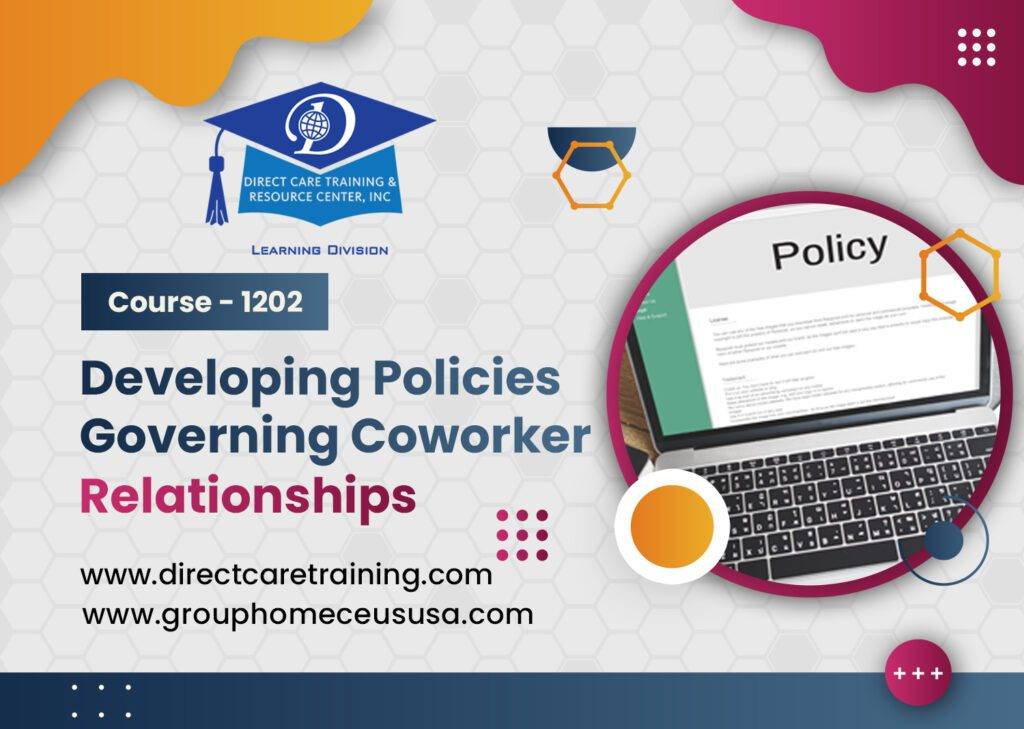
In the compassionate and intricate environment of group homes, it is essential to foster a sense of teamwork, trust, and professionalism. These homes cater to some of our society’s most vulnerable members, and those who work there hold the weighty responsibility of providing care, support, and stability. As such, the relationships among co-workers can profoundly influence the home’s environment, either enhancing or diminishing its efficacy and the well-being of its residents. That’s why many group homes are reevaluating their internal policies governing co-worker relationships.
Direct Care Training & Resource Center, Inc. has a continuing education (CEU) learning product that
discusses this very matter, with a specific focus on the group living environment.
1 . Why is there a need for policies on co-worker relationships?
Group homes, like any workplace, are not immune to the intricacies of human interaction. Friendships, conflicts, and even romantic relationships may develop among staff members. Such relationships can:
- Impact the overall dynamics of the team.
- Lead to perceived or real favoritism.
- Cause disruption in the workflow if not managed appropriately.
Therefore, clear guidelines help in understanding the acceptable boundaries and behaviors in a professional setting.
2 . Walking the Tightrope: Policy Creation Without Overreach:
A major challenge is to draft a policy that isn’t overly intrusive or restrictive. Overstepping can:
- Encroach on personal freedoms.
- Violate privacy rights.
- Create an atmosphere of distrust.
To strike the right balance, it’s essential to focus on the impact of relationships on the work environment rather than the relationships themselves.
3 . Key Elements of an Effective Policy:
Transparency: Any policy should be clear about its objectives. It’s not about policing personal lives but ensuring that the professional environment remains conducive to care and support.
Discretion: While it’s crucial to address potential conflicts, the policy should be sensitive to individual privacy. A discreet approach helps in building trust among employees.
Flexibility: One size doesn’t fit all. A policy should consider the varied nature of relationships and offer room for individual circumstances.
Conflict Resolution: Ensure mechanisms to address any issues arising from co-worker relationships. This can include mediation, counseling, or reassignment if needed.
Regular Review: The nature of human relationships is ever-evolving. Regular reviews of the policy ensure its relevance and effectiveness.
4 . Prioritizing Professionalism Over Personal Interests:
The primary objective of a group home is the well-being of its residents. Employees should be made aware that while personal relationships aren’t discouraged, the primary commitment is to the mission of the group home.
Direct Care Training & Resource Center, Inc. has a continuing education (CEU) learning product that
discusses this very matter, with a specific focus on the group living environment.
5 . Respecting the Law:
Lastly, it’s paramount to ensure that the policy doesn’t violate any employment laws or rights. Engaging legal counsel during the policy drafting phase can help navigate this delicate balance.
Our Summary and Conclusion…
Policies governing co-worker relationships in group homes are not just about setting boundaries but about ensuring that these sanctuaries function at their optimal level. By focusing on the broader picture of resident well-being and the home’s mission, it becomes easier to understand why such policies are essential. Moreover, by treading with sensitivity and respect, it’s entirely possible to uphold professional standards without trampling on individual rights and freedoms.


Another Blog Post by Direct Care Training & Resource Center, Inc. Photos used are designed to complement the written content. They do not imply a relationship with or endorsement by any individual nor entity and may belong to their respective copyright holders.
| Follow us in the Social Stratosphere… | ||||
|
|